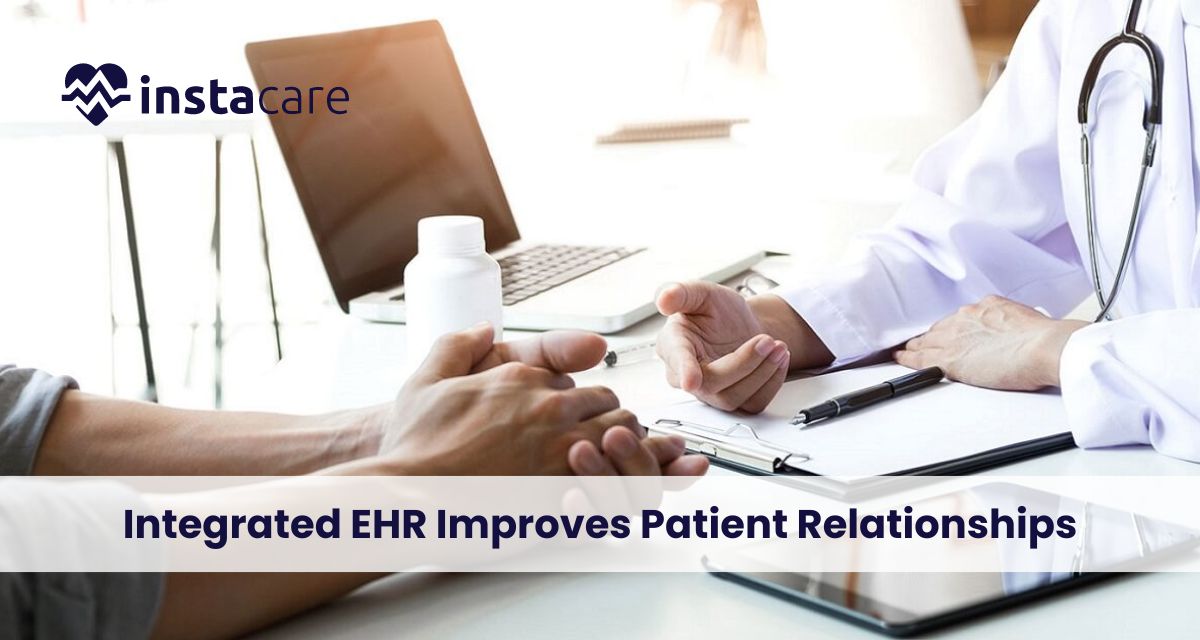Last updated on Thursday, 13, June, 2024
Table of Contents
How an Integrated EHR Improves Patient Relationships?
Integrated Electronic Health Records, or EHR, improves patient relationships, alters the way healthcare providers need to manage information about their patients. Because they consolidate all of the information about a patient into one accessibly located platform, all medical history, test results, and treatment plans are easily accessible. Thus, healthcare professionals always have the ability to make the most accurate diagnoses and individually tailored treatment plans. For instance, a doctor can look up past treatments for a patient and drugs that a patient is currently taking in order to avoid prescribing medicines that conflict with any of those already prescribed; and this integration reduces error and improves the quality of care in general.
Better Communication Amongst Healthcare Providers
If all specialists, general practitioners, and nurses are viewing the same information regarding a patient, then collaboration is far more effective. All these share access so that all healthcare professionals are up to date on what condition their patient is at what stage of treatment. A specialist may read the notes and recommendations of a patient’s primary care physician so he can align his advice with ongoing treatments. All this reduces redundancy of tests, miscommunications or lost Instructions.
What is more, integrated EHRs have the advantage of immediate update; hence, new test results or changes in treatment plans are made available to all concerned providers in real time. These above cited coordination and timeliness interject into a patient’s experience and outcomes.
More Patient Engagement And EHR Improves Patient Relationships
They can log in and see their health information and their progress and test results. It involves them with their care. They’ll understand more about their disease and treatment that way. A better decision develops. Some portals even permit the patient to schedule appointments request prescription refills and Inbox their health care provide. It saves time that could be wasted in making numerous phone calls or visiting the offices just to get information. It is saving time for both parties, the patient and the provider. More the patient feels they are in charge or better in control and informed of their care, the more they are going to trust doctors.
Reduce Administrative Burden
One of the greatest advantages of integrated EHRs is the simplification of administrative processes. Paper records are challenges complete and full of errors. To this effect, if information about a patient after admission is entered in a single data field, it can automatically become available to other departments without having to capture the same information time and again. This, therefore, reduces errors meaning that patients’ records are updated and accurate. Besides, integrated EHRs make the billing process less tedious in that coding and billing goes on automatically.
This leads to fast, accurate billing, which reduces lag time in payment processing and ensures there are fewer medical billing mistakes. Because their back offices run smoothly, physicians can now devote less time to administration and more to the care of their patients.
Enhanced Data Security And Compliance
Data is, in fact, an important asset from a security point of view in the field of healthcare, and integrated EHRs play a tremendous role in securing patients’ information. They are now provided with extended security features like encryption, access controls, and audit trailing to ensure that sensitive data rests in the safety of only authorized personnel. Compliance issues like that with the health insurance portability and accountability act have been taken care of within the system, which see to it that the patients’ information is handled according to the law. This kind of depth on security creates confidence for the patients that their personal health information is safe.
In addition, integrated EHRs enable comprehensive monitoring and auditing of data access and data use. This aids in the rapid identification of the security problem and dealing with them before they have a negative impact. Hence, healthcare providers will have confidence that they are meeting the regulatory standards and safeguarding the privacy of the patient.
Better Health Outcomes Through Data Analytics
Integrated EHRs are also very helpful in enhancing health outcomes depending on data analysis. It can dive into vast, prolific amounts of data about patients that would otherwise be invisible if looked for conventionally. An example would be which treatments work best for given conditions or identification of early warning signs that may signal the potential onrush of Health problems. All this information allows doctors and other health care providers to arrive at better, more informed decisions and develop personalized treatment models.
Also, predictive analytics can help identify patients’ risks of any chronic conditions to take early measures to prevent this from happening or reduce such problems if they develop.
Facilitated Chronic Disease Management
Integrated electronic health records, therefore make the management of chronic diseases easier both on the patient and the healthcare provider. The systems facilitate an unbroken update of the person with a chronic disease; thus, treatment is offered at the earliest and appropriate time, and treatment plans are changed if need be. For instance, a patient with diabetes may have their blood sugar levels monitored and trended overtime to see the effectiveness of the treatment given. Health care providers can then take this information and make the proper alterations and individualized health care plans.
Another advantage of integrated EHRs is better coordination between varied health care providers who treat a patient. Everyone treating the patient has access to an updated record of the patient, reducing risks associated with incomplete information.
Effective Management Of Emergent Situations
Time is the essence in emergency situations, and integrated EHRs give a crucial edge to healthcare providers by giving them instant access to the most vital information about the patient. A patient’s history-everything from allergies to medications to treatments-can be instantly retrieved; something very important while making some of the most important decisions in the most pressurizing cases. This instant access to accurate information enables healthcare providers to make a huge difference to the result of emergency care. For example, a doctor who knows of a patient’s allergy to a certain medication can avoid life-endangering reactions.
Conclusion
Integrated EHRs bring about better patient relations in three significant ways: better quality of care, improved communications, and increased patient engagement and satisfaction. They make administrative processes more efficient, keep data secure, and improve health outcomes through analytics of the data. They give tremendous benefit for patients with chronic diseases as well as in emergency situations. By bringing all the information about the patients on one single platform, the health providers deliver better and more coordinated care thus resulting in better results and a sound customer-health provider relationship.
FAQ’s
1-What is Integrated EHR System?
An Integrated Electronic Health Record system is a platform of digital nature that brings all of the health information about the patients, including medical history, results, treatment plans, and so much more into one accessible platform. All this is in efforts to improve the quality of care to the patient by ensuring that healthcare provider flawlessly gets most current data about the patient in an accurate manner.
2-How Do Integrated EHR Systems Improve Patient Relationships?
These systems have better quality of care, better communication amongst the healthcare providers, and offer greater patient engagement, which means a better relation. Because patients can safely access their health records, which allows them to be more informed about and involved in their care, the transparency and empowerment that result give them a basis for trusting and being satisfied with care and, therefore this can help solidify the relations between the patient and provider.
3-Are Integrated EHR Systems Secure?
Yes, integrated EHR systems are designed innately with stringent security measures to protect the information of the patients. Advanced encryption, access controls, and audit trails are applied in these systems to ensure privacy and security of the data. Equally important is that integrated EHRs comply fully with regulations such as the Health Insurance Portability and Accountability Act -HIPAA, which has strict standards for information handling of the patients.
4-How Do Integrated EHR Systems Benefit Healthcare Providers?
These incorporated EHR systems minimize administrative processes, such as paperwork, and minimize the occurrence of errors. They promote communication between various healthcare providers and therefore enable more coordinated and effective care for patients. Eventually, these kinds of systems leverage data analytics, which improves health outcomes in cases where the providers can make informed decisions and offer personalized treatment plans.



